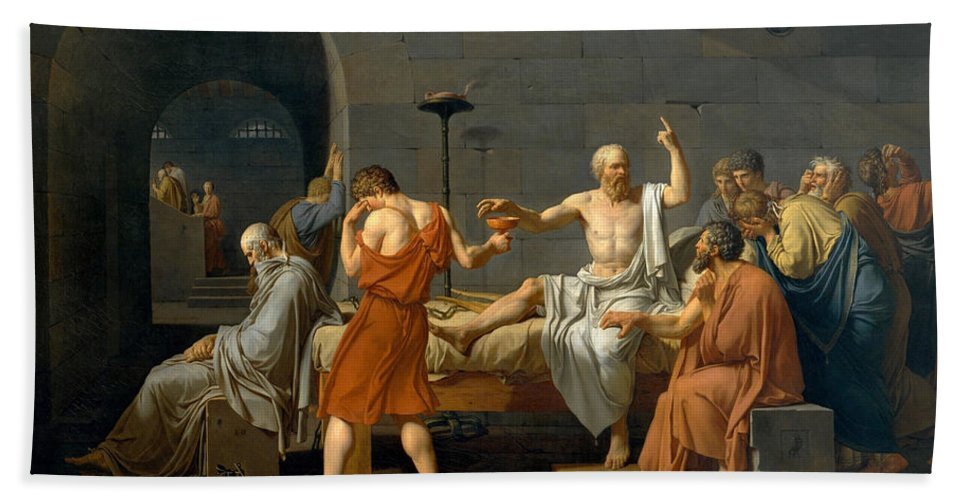The Apology by Plato
The Apology by Plato is a narrative of the notorious speaker, Socrates’ speech made at the trial when the states convicted him of not acknowledging the gods. According to the charges, Socrates corrupted the youths through controversial theories and teachings that went contrary to their deity. Additionally, he taught some unlawful ideas that leave an adverse effect on both societies and individuals. Socrates was found guilty of manipulating the young people of Athens and forming false believe in his supernatural deities as opposed to state gods. The term apology originated from the Greek word “apologia,” which means a speech made in defense. In the narrative “The Apology,” Socrates does not necessarily apologize for his actions, but rather defending himself.
For the vast part of the apology, Socrates communicates in a manner that is somewhat very plain and conversational. Socrates warned that he was not accustomed to court system regularities, and instead, he was to apply honesty and directness, just like his character. In his defense, Socrates pointed out that a prophecy orchestrated his behavior by the oracle taunting him as the noblest of all men (Reeve 4). He acknowledges that he has little or no enlightenment when it comes to the world, and at the same time, concluding that he is wiser than other men. It brings about contradiction since how can one say that he is smarter than all people but still so damn and unknowledgeable about the world? It does not make sense. Socrates was determined to spread his peculiar wisdom, but how was he going to execute that? As such, he took the issue of questioning the supposed “wise” men as his moral obligation, not to mention exposing their intellect as negligence. Such charismatic activities won the hearts of many youths in Athens. At the same time, the issue sparked anger and hatred for individuals; he was humiliating.
Philosophy about dialect when an individual puts forward an argument and others might critique, improve the idea, or agree to it. Counter-arguments challenge opinions, and as such, the presupposed “wise” men should have put forward a way to defend their philosophical ideas as opposed to prosecuting someone who was trying to resist their ideologies. Socrates pleads for his defense, making an excellent counter fact against the charges of manipulating the minds of young people of Athens. First, Socrates insists that Meletus, the plaintiff, cares nothing concerning the young people of Athens, not to mention that he lacks real enlightenment on the subject (Reeve 4). Second, Socrates points out that if indeed he was influencing the youth wrongfully, it was unintentional, and that he was standing trials as an innocent person. Lastly, Socrates disregarded Meletus claims that they lacked supporting information or evidence and that there was not even a single witness to affirm Socrates’ charges. The three were fundamental arguments for Socrates’ defense.
Meletus was confronted by the question that if there exists a single person who can choose to be harmed in his/her rightful mind, and Meletus was quick to answer, “of course not” (Hackforth 56). Still, Meletus held that Socrates was deliberately corrupting the youths of Athens. Socrates understands that wicked people are prone to causing harm to both strangers and colleagues. As such, he keeps’ strong ties with his followers and does not intend to harm himself. Hence, Socrates has no intentions or can never have ulterior motives toward the youth. Socrates further added that if he did not intend to manipulate the youth of Athens, then, Meletus charges could not be of any significant value as Socrates charges will be termed as an involuntary misdemeanor.
Usually, when individuals unwillingly engage in crimes, they do not stand trials in the court; instead, they are given sage to give light on the errors of their ways. Why is Socrates standing trials in the court? Perhaps, someone should have tried providing insights to Socrates, and things would have been different, or he could have ceased “manipulating” the youth. Socrates even goes on highlighting that there was nobody who showed any concerns in trying to guide him on his alleged lousy demeanor. So, it still does not appeal as significantly as to why he was brought to court. The court is meant for individuals who are guilty of their crimes as opposed to those who require enlightenment. Throughout Socrates and Meletus’ conversation, it was so explicit and direct, more importantly, intended to humiliate Meletus instead of arriving at the truth (Danzig 12).
Following the case ruling that Socrates was found guilty of the offence, he was requested to suggest a penalty. Socrates jokingly proposes to receive an honor of great meal for being such a fundamental asset to the state services as the basis for what he deserved. Socrates seriously disregarded any attempt to put him in jail or exile, instead of considering to pay a fine. The prosecutor could not buy any of his proposals, and he was sentenced to death. It was pretty much unfair to sentence him to death because there was no evidence, but the law ruled in favor of the people who felt like Socrates was posing a threat to them and their religion. Even so, he accepted the death sentence, and he believed that nobody understands what happens after death. As such, Socrates faced his death with absolute courage as he did not know what death felt like. Socrates could not hesitate to hit out at all jurymen who voted against him, stating that they were more determined to silence him instead of listening to him. He finished by telling them that they have caused more harm to themselves than they have harmed him.







